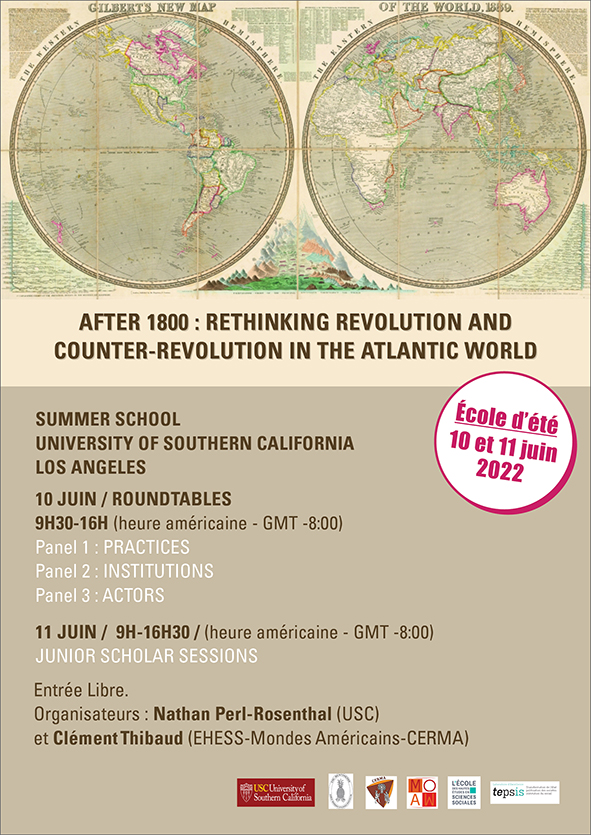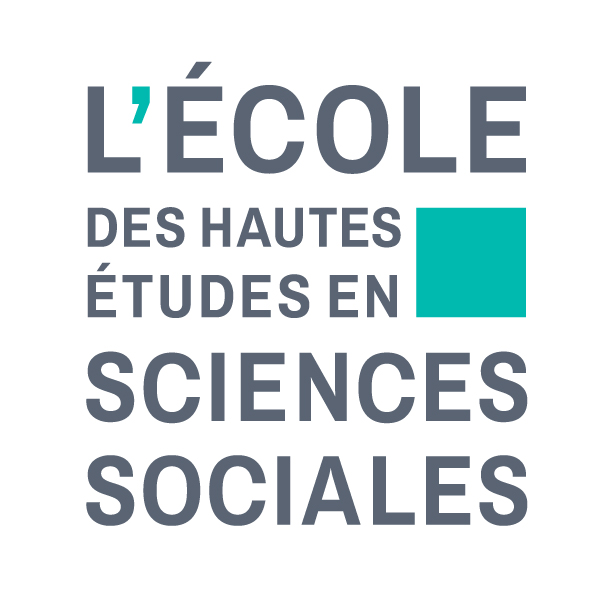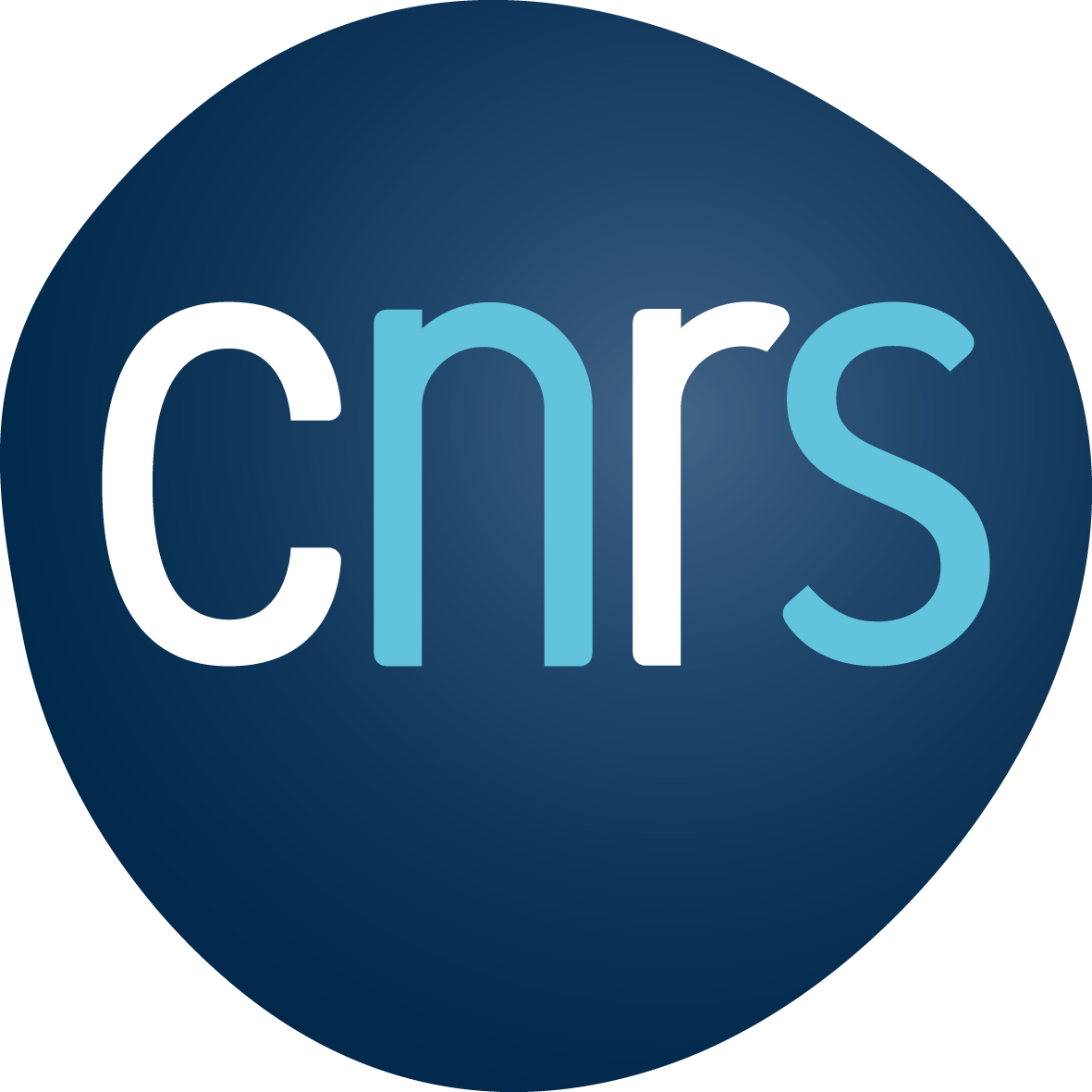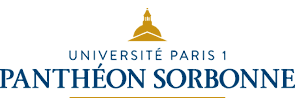Actualités du laboratoire | 2022-2024
École d'été - After 1800: Rethinking Revolution and Counter-Revolution in the Atlantic World
10 et 11 juin 2022, Los Angeles
École d'été
After 1800: Rethinking Revolution and Counter-Revolution in the Atlantic World
Vendredi 10 et samedi 11 juin 2022
Summer School University of Southern California-EMSI/EHESS-Mondes Américains
USC Dornsife, University of Southern California
Los Angeles
Organisateurs : Nathan Perl-Rosenthal (USC) et Clément Thibaud (EHESS-Mondes Américains-CERMA)
General description
The recent historiography of the age of revolutions has put into question the traditional division of the field into categories of revolution and counterrevolution. By allowing us to integrate into the history of the revolutionary Atlantic world movements and processes that would once have been considered simply counter-revolutionary, this shift has opened up new perspectives on the period.
One possibility that this opens up is of renewing our attention to the world and vision of revolutionary “losers” without reducing them to the status of traditionalists resisting the future or mere dead ends. Enslaved people and Natives in the British army, loyalist Natives who fought in the Latin American wars of independence, and formerly enslaved soldiers in Haiti all invoked God and monarchs while challenging the colonial status quo. Once considered reactionaries, these groups and their political role have been reevaluated by recent scholarship. In reimagining their place in the revolutionary world, we are able to break out of a simplistic opposition between millenarian, messianic and organicist movements on the one hand, and revolution imagined as the construction of a rational, individualized, and secular world on the other.
More broadly, this reconsideration of revolution and counter-revolution allows us to move beyond the binary opposition between revolutionary processes considered as necessarily “progressive” and counter-revolutionary processes figured as nostalgic or reactionary. Consider Toussaint Louverture, an individual whose political activity straddled the divide between revolution and counter-revolution, and who fused a struggle against the colonial system with the reestablishment of forced labor, all under the aegis of a military regime at times hostile to republicanism. Similarly, the liberal republicans of the Directory and of the new Latin-American nations embraced a relaunch of the colonial enterprise under the guise of extending “liberty” and “regenerating” subject races.
Third, this perspective leads to a chronological displacement in the study of the age of revolutions, since it is during the period after the supposed “axial age” of the Atlantic revolutions, from the American war through Haitian independence, when we can get the clearest view of the admixture of revolution and counter-revolution. In this regard, the era of Latin American independence is of particular interest, since it becomes extremely difficult to characterize the conflict in general as a struggle between revolutionaries and counter-revolutionaries. The same could be said of the first French empire and the Restoration, as well as the post-1800 American federal republic.
Program
Les horaires des conférences sont en heure américaine.
Si vous souhaitez les suivre en visioconférence, après inscription, le décalage horaire est de plus 9h pour la France.
Friday, June 10, Roundtables
By videoconference Zoom : please register
9:30 am : Coffee & pastries
Panel 1: PRACTICES : 10 am-11:30 am PDT
• Brian DeLay, (University of California, Berkeley)
• David Bell, (Princeton University)
• Geneviève Verdo, (Université Paris 1 Panthéon-Sorbonne-Mondes Américains-CRALMI)
This roundtable will focus on how political and cultural practices—in the broad sense of the term—did and did not change in the revolutionary era after 1800. To what extent was there continuity in revolutionary practices between the first and second phases of the age of revolutions? Were there new elements of political or cultural practice that only emerged after 1800? How did older practices change or evolve in the post-1800 context? And what was the relationship, in terms of practice, between revolution and counter-revolution? Did revolutionaries and counterrevolutionaries draw on a shared repertoire of practices?
Panel 2: INSTITUTIONS : 12:30 pm-2:00 pm PDT
in Spanish
• Andréa Slemian, (Universidade Federale de Sao Paulo)
• José Maria Portillo Valdes, (Universidad del País Vasco)
• Clément Thibaud, (EHESS-Mondes Américains-CERMA)
The era after 1800 was a significant period for the making and unmaking of institutions in the revolutionary Atlantic world. This roundtable will consider the ways in which revolutionaries and counterrevolutionaries tried to consolidate their positions through creating and destroying institutions. What were the key institutions that were made and unmade after 1800 in Europe, the Americas, and elsewhere? To what extent can particular institutions be classified as “revolutionary” or “counter-revolutionary?”
Panel 3: ACTORS : 2:30 pm-4:00 pm PDT
• Chuck Walker, (University of California, Davis)
• Nathalie Pierre, (Howard University)
• Nathan Perl-Rosenthal, (USC-EMSI)
The revolutionary period after 1800 had a distinct cast of characters. These included both members of younger generations and individuals in regions (Latin America, East/Central Europe, North American interior) that had been relatively untouched by revolution before 1800. Did these actors’ political orientation(s) differ in meaningful and consistent ways from those of earlier revolutionaries? What if anything was distinctive about their politics and their contribution? Did they fit into the revolutionary/counter-revolutionary binary—or challenge it?
Saturday, June 11, 2022
Junior Scholar Sessions
By videoconference Zoom : please register
General description
We're focusing on the tangled relationship between revolution and counter-revolution in the period after 1800. Does the revolution/counter-revolution binary that structures much of the field hold up post-1800? How "revolutionary" can we consider traditional and reactionary movements during this period? To what extent is this blurring of lines (if that is right) characteristic of the later age of revolutions? Does breaking out of this binary view help us see the political movements in the different Atlantic regions as a coherent whole in new ways?
9:00 am : Coffee & pastries
Session 1: 9:30 am -11:00 am
• Mathieu Ferradou, (Université Paris-Nanterre)
“After 1800 from an Irish perspective: the 1797-1798 counter-revolutionary turn”
Commentator : Nathan Perl-Rosenthal
• Silvia Escanilla Huerta, (University of Illinois at Urbana-Champaign)
“The fate was to banish or kill the chapetones:” The Revolutionary Experiment in Huánaco”
Commentator : Chuck Walker
Session 2: 11:00 am -12:30 pm
• Glauco Schettini, (Fordham University)
“Nations Under God, 1808-48”
Commentator : José Maria Portillo Valdés
• Frédéric Spillemaeker, (EHESS-Mondes Américains-CERMA)
“The royalist military reaction: complex logics of power”
Commentator : David Bell
Lunch: 12:30 pm -1:45 pm
Session 3: 1:45 pm - 3:15 pm
• Miriam Liebman, (Adams Papers, Massachusetts Historical Society)
“The Republican Revolutionary: Ruth Baldwin Barlow in Europe, 1789-1815,”
Commentator : Brian DeLay
• Matthijs Tieleman, (University of Arizona)
“A Constitutional Revolution”
Commentator : Geneviève Verdo
Session 4: 3:30 pm -5:00 pm
• Ana Joanna Vergara Sierra, (University of Minnesota)
“The Escribano of Babel: power, exile, and enslavement in the Venezuelan plains during the war of independence (1806-1835)”
Commentator : Andréa Slemian
• Carrie Glenn, (Niagara University)
“After Haitian Independence: The “Quadroon” in Exile”
Commentator : Nathalie Pierre
Avec le soutien du laboratoire Mondes Américains, de l'University of Southern California et du LabEx Tepsis.
 Actualités
Actualités
Les Rendez-vous de Mondes Américains
 Rencontres scientifiques - Mercredi 24 avril 2024 - 09:00Le laboratoire Mondes Américains (UMR 8168) vous invite à la troisième édition des Rendez-vous de Mondes Américains, consacrés à la présentation, aux commentaires et à la discussion de quatre ouvrages récents et d'un film documentaire des (...)(...)
Rencontres scientifiques - Mercredi 24 avril 2024 - 09:00Le laboratoire Mondes Américains (UMR 8168) vous invite à la troisième édition des Rendez-vous de Mondes Américains, consacrés à la présentation, aux commentaires et à la discussion de quatre ouvrages récents et d'un film documentaire des (...)(...)
Entretien avec Marie Assaf, doctorante de l'EHESS, sur l’état de la recherche sur les politiques du handicap
Échos de la recherche -Doctorante de l'EHESS en Études Politiques (Centre d'études nord-américaines - Laboratoire Mondes américains), Marie Assaf travaille sur les politiques d'emploi à destination des personnes handicapées aux États-Unis. À travers son analyse ethnographique des pratiques et di (...)(...)
Les Rendez-vous de Mondes Américains
 Rencontres scientifiques - Mardi 18 avril 2023 - 09:30Mondes Américains (UMR 8168) organise la deuxième édition des Rendez-vous de Mondes Américains, consacrée à la présentation et à la discussion de sept ouvrages récents des membres du laboratoire.Les publications aborderont des thématiques his (...)(...)
Rencontres scientifiques - Mardi 18 avril 2023 - 09:30Mondes Américains (UMR 8168) organise la deuxième édition des Rendez-vous de Mondes Américains, consacrée à la présentation et à la discussion de sept ouvrages récents des membres du laboratoire.Les publications aborderont des thématiques his (...)(...)
Mondes Américains -
UMR 8168
EHESS
2, cours des Humanités
93322 Aubervilliers cedex
France
Tél. : +33 (0)1 88 12 03 99
Communication :
T. +33 (0) 1 88 12 03 44





